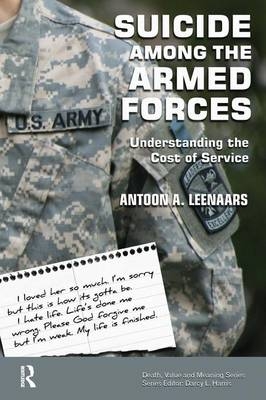
Suicide Among the Armed Forces
Baywood Publishing Company Inc (Verlag)
978-0-89503-874-6 (ISBN)
Antoon A. Leenaars , PhD, CPsych, CPQ, is a psychologist in private practice in mental health and public health in Windsor, Canada, and Senior Advisor to the Norwegian Institute of Public Health, Oslo. He is the first past president of the Canadian Association for Suicide Prevention (CASP) and a past president of the American Association of Suicidology (AAS). He has published extensively, including his book Suicide and Homicide-Suicide Among Police , and was the first editor-in-chief of the journal Archives of Suicide Research . Dr. Leenaars has received the International Association for Suicide Prevention's Erwin Stengel Award, CASP's Research Award, and AAS's Edwin Shneidman Award. He has consulted to the WHO and provided forensic services in cases of wrongful death, suicide, homicide-suicide, and homicide.
Preface
Acknowledgments
PART ONE Introduction
CHAPTER 1
The Military and Suicide
CHAPTER 2
Suicide
CHAPTER 3
The Psychological Autopsy
PART TWO Historical Study
CHAPTER 4
Military Suicide: A Classic Population Study
CHAPTER 5
Military Suicide: A Historical Individual Case Study
PART THREE Current Study
CHAPTER 6
Suicide among the American Armed Forces
CHAPTER 7
Suicide among the Canadian Forces
CHAPTER 8
Surveillance and the Reliability of Military Suicide Statistics
PART FOUR Beyond Suicide
CHAPTER 9
The Many Faces of Violence: Homicide, Accidental Deaths, Self-Harm, and Incarceration
PART FIVE Military Efforts
CHAPTER 10
The Psychology of Military Suicide
CHAPTER 11
Posttraumatic Stress Disorder
CHAPTER 12
Suicide Prevention in the Military
PART SIX A Case Study
CHAPTER 13
A Soldier’s Story Told: A Psychological Autopsy
PART SEVEN Prevention and Policies
CHAPTER 14
Military Suicide: Policies and Prevention
References
Index
| Reihe/Serie | Death, Value and Meaning Series |
|---|---|
| Verlagsort | Amityville |
| Sprache | englisch |
| Maße | 152 x 229 mm |
| Gewicht | 476 g |
| Themenwelt | Sachbuch/Ratgeber ► Gesundheit / Leben / Psychologie |
| Geisteswissenschaften ► Psychologie ► Klinische Psychologie | |
| Geisteswissenschaften ► Psychologie ► Trennung / Trauer | |
| Medizin / Pharmazie ► Medizinische Fachgebiete ► Notfallmedizin | |
| Medizin / Pharmazie ► Medizinische Fachgebiete ► Psychiatrie / Psychotherapie | |
| Sozialwissenschaften ► Politik / Verwaltung | |
| Sozialwissenschaften ► Soziologie | |
| ISBN-10 | 0-89503-874-9 / 0895038749 |
| ISBN-13 | 978-0-89503-874-6 / 9780895038746 |
| Zustand | Neuware |
| Haben Sie eine Frage zum Produkt? |
aus dem Bereich


